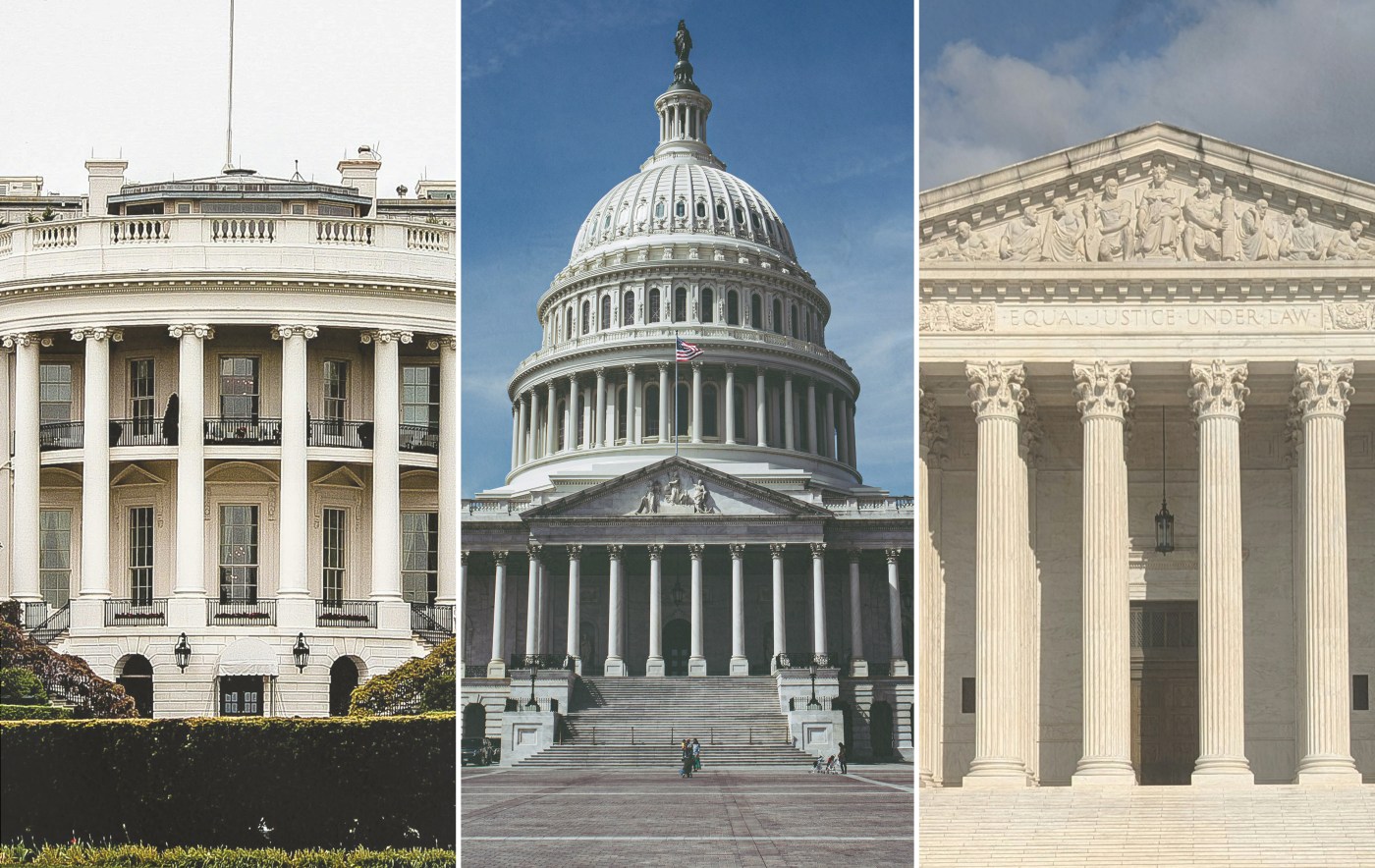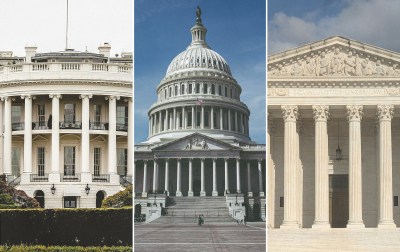Since taking office in January, the Trump administration has been widely criticized for potential conflicts of interest, including the Trump family’s deep ties to cryptocurrency, the Trump Organization’s extensive business operations abroad, and the reliance on federal funding by close allies to the White House.
The Supreme Court has also come under scrutiny in recent years for several ethics scandals, leading to the adoption of an official code of conduct for justices in late 2023.
Simultaneously, congressional officials like former Republican Rep. George Santos and ex-Democratic Sen. Robert Menendez have committed ethics violations leading to resignations, expulsions, and even prison.
What is the ethics framework for each branch of government, who investigates misconduct, and how is disciplinary action taken? While all three branches have processes for investigating ethics violations, they are largely self-regulating, often weak on enforcement, and all differ substantially from one another.
Executive Branch
The executive branch uses a layered system of ethics bodies and officials to ensure compliance across the 15 departments and approximately 140 agencies it compromises.
Created in 1978, the Office of Government Ethics (OGE) oversees the executive branch’s ethics programs. Its duties include creating and interpreting ethics rules, training ethics officials, administering financial disclosure systems, and ensuring compliance among agencies. The department was initially part of the Office of Personnel Management, but was granted independence as a separate agency in 1988. In 1992, it established the Standards of Ethical Conduct for Employees of the Executive Branch—a single set of standards for all executive branch employees. In December 2024, David Huitema was appointed as the new director of OGE—a position that comes with a five-year term. However, he was fired by President Donald Trump in February 2025, and the position remained vacant as of July with Jamieson Greer, the U.S. trade representative, serving as acting director of the office.
Within each executive agency, the OGE’s guidance is enacted by designated agency ethics officials (DAEOs), who are appointed by the heads of their respective agencies. These ethics officials are responsible for reviewing financial disclosures, resolving conflicts of interest, educating agency officials on ethics standards, and enforcing ethics rules within their agencies.
According to Kedric Payne, senior director of ethics at the Campaign Legal Center, DAEOs mostly oversee financial disclosure requirements, but can also become involved in other matters, including resolving conflict of interest disputes, such as when an official holds financial interests in an industry that his or her agency has regulatory power over. However, when more complex ethics questions or violations arise, agencies turn to their respective inspector general. “When it comes to enforcement, and when there's an investigation that is needed as opposed to just a clear violation of the rule and noncompliance, the inspector general gets involved,” Payne said. “And that inspector general can determine if there's enough evidence to warrant that the Department of Justice should take on a violation of the ethics rules.”
At the highest levels of executive leadership, however, ethics enforcement becomes more complicated. White the Executive Office of the President has its own DAEO who can conduct basic investigations, collect evidence, and interview witnesses—currently Scott Gast, deputy counsel to the president—the White House has no inspector general to carry out more complex investigations. Instead, it is left up to the president to determine whether a more robust investigation should begin and disciplinary action be taken. This is true both for White House officials and employees as well as Cabinet members. “When it comes to the high level officials at the secretary level, it comes to the president,” Payne explained. The Department of Justice can also investigate and prosecute ethics violations independently in cases where criminality is present.
There is no formal investigatory or disciplinary process within the executive branch to handle instances where the president themself is accused of ethics violations, and it is generally understood that the DOJ cannot prosecute a sitting president. In 1973, during the Watergate scandal, the White House Office of Legal Counsel determined in a memorandum that both the president and vice president are immune from criminal indictment and prosecution while they hold office—a policy that the DOJ has maintained ever since. Instead, investigation of misconduct by sitting presidents must originate from Congress through the impeachment process.
Legislative Branch
Like the executive branch, Congress is largely self-regulating on issues of ethics, setting as well as enforcing its own rules of conduct. This power is established by Article 1, Section 5 of the U.S. Constitution, which grants both the House of Representatives and the Senate the sole capacity to “determine the Rules of its Proceedings, punish its Members for disorderly Behaviour, and, with the Concurrence of two thirds, expel a Member.”
Both chambers of Congress enforce ethics through their respective ethics committees—the only committees that maintain a fifty-fifty bipartisan split regardless of which party holds a majority in either chamber. “What that means in practice is that Congress polices themselves,” Payne explained. “And they don't typically find that there is a violation or punish anyone, except in the most extreme examples.”
The House’s ethics committee was first established as a temporary select committee in 1966, and it became permanent in 1967. The House Committee on Ethics is tasked with suggesting changes to ethics laws, investigating violations of the chamber’s code of conduct, recommending disciplinary actions, and offering both formal and informal ethics guidance to members, officers, and staff. It is also responsible for ensuring compliance with financial disclosure requirements implemented by the 1978 Ethics in Government Act.
One other ethics body—the Office of Congressional Conduct—also operates in the House. It receives complaints from the broader public and can conduct preliminary investigations before referring matters to the Committee on Ethics. However, while the office serves as a nonpartisan fact finder, it cannot compel testimony or subpoena documents, or levy sanctions.
Complaints filed with the House Committee on Ethics are typically made directly by members of Congress, however, there is a provision that allows non-members to submit complaints with the endorsement of a member. Complaints can also be referre to the committee by the Office of Congressional Conduct. When the committee receives a complaint, the chair and ranking minority member of the committee together determine whether the complaint meets the standard required for referral to an investigative subcommittee. If referred, a subcommittee composed of up to four members of the committee is formed and proceeds with an investigation, eventually adopting a Statement of Alleged Violation if it determines that there is “substantial reason to believe that a violation of the Code of Official Conduct, or of a law, rule, regulation, or other standard of conduct applicable to the performance of official duties or the discharge of official responsibilities by a Member, officer, or employee of the House of Representatives has occurred.”
The broader committee then forms a six-member adjudicatory committee, which conducts additional investigatory work and votes on each allegation. If any counts are proven, a committee hearing is held to determine what sanctions should be recommended to the House, including fines, censure, or expulsion. The committee can also issue a letter of reproval, which disapproves of conduct, but doesn’t recommend further sanctions. With a two-thirds vote, it may also choose to refer the issue to federal, state, or local law enforcement authorities. Once recommendations have been made to the House, the full body approves sanctions by a simple majority vote, except in the case of a proposed expulsion, which requires a two-thirds vote. The most recent member of Congress to be investigated and expelled was Santos. After being charged by the DOJ with conspiracy, wire fraud, false statements, falsification of records, aggravated identity theft, and credit card fraud, he was expelled on a 311-114 vote in December.
The Senate Select Committee on Ethics, which is made up of six members, operates similarly to the House Committee on Ethics. Any member of the Senate or staffer can file a complaint with the committee, after which the committee’s chairman and vice chairman determine the proper length and scope of an investigation. Once an investigation is complete, the committee’s staff and/or outside counsel issues a report to the committee, after which the committee will vote on whether credible evidence of wrongdoing exists.
If the evidence is viewed as credible, the committee proceeds with an adjudicatory review, after which it reports its findings and recommendations to the Senate, including censure, payment of restitution, and expulsion. The Senate then votes on the recommendations.
Judicial Branch
Ethics requirements and disciplinary procedures differ between the Supreme Court and lower federal courts like the U.S. Court of Appeals and U.S. district courts. And, while the executive and legislative branches both have designated enforcement bodies, the Supreme Court does not.
Lower court judges are subject to the Code of Conduct for United States Judges—a set of ethical canons adopted in 1973 by the Judicial Conference of the United States, a body established by Congress in 1922 that sets nationwide policy for U.S. courts. While this code of conduct offers guidance as to how judges should behave, it is only aspirational and has no inherent enforcement mechanism.
Instead, enforcement against lower court judges is governed by the Judicial Conduct and Disability Act of 1980, which established a process by which any individual can file complaints alleging that a judge has “engaged in conduct prejudicial to the effective and expeditious administration of the business of the courts.” However, because the disciplinary process is not linked directly to the Code of Conduct for United States Judges, violations of the code are not always addressed with disciplinary action. “They have a disciplinary process, but violating the code does not trigger discipline the way it should in the lower federal courts,” Charles Gehy, professor of law at Indiana University, told The Dispatch.
The complaint, investigation, and disciplinary process—when it does take place—is relatively simple, and relies heavily on the chief judge in whichever court the complaint is filed.
Anyone is permitted to file a complaint against a lower court judge by submitting the complaint to the clerk’s office of the U.S. Court of Appeals or regional circuit in which the judge serves. The chief judge will then consider the complaint and determine whether it has merit, after which it will be dismissed, concluded, or referred to a special committee for investigation.
If a special committee is formed, it will “conduct an investigation as extensive as it considers necessary, and shall expeditiously file a comprehensive written report thereon with the judicial council of the circuit,” which will present both the committee’s findings and recommendations for disciplinary action. The judicial counsel can then dismiss the complaint, conduct additional investigation, or take disciplinary action including temporary suspension and a public or private censure.
In certain cases, the judicial counsel may also refer the matter even higher to the Judicial Conference of the United States. The conference can concur or make its own determination on the case, consider whether impeachment of the judge is warranted, and recommend to the House of Representatives that impeachment be considered. Congress can then remove the judge through the standard impeachment process: A majority vote in the House to impeach, and a two-thirds vote in the Senate to convict. Judicial impeachments do happen, but they are relatively rare. Since 2000, only two federal judges have been impeached, only one of whom was eventually convicted and dismissed.
Unlike in lower courts, the U.S. Supreme Court is not subject to any formal investigatory or disciplinary process. “One of the primary criticisms of the Supreme Court code is that it does not have an underlying disciplinary process to enforce code violations,” Gehy explained.
Until recently, the Supreme Court had no formal ethics code at all. In 2023, however, following public scrutiny, the Supreme Court adopted an official code of conduct based largely on the code of conduct for lower court judges. While this code offered guidance on good conduct, it didn’t introduce any formal process for investigating or disciplining justices. “The code of conduct is there for one purpose and one purpose only, which is to provide guidance as to the ethical responsibilities of judges and to convey to the public what the expectations of the justices are,” Gehy said. “But, if a justice violates the code of conduct, there is no mechanism to discipline.”
Supreme Court justices are therefore—in cases when the Department of Justice does not prosecute for criminal violations—subject to formal disciplinary action for ethics violations only through Congress’ impeachment power.







Please note that we at The Dispatch hold ourselves, our work, and our commenters to a higher standard than other places on the internet. We welcome comments that foster genuine debate or discussion—including comments critical of us or our work—but responses that include ad hominem attacks on fellow Dispatch members or are intended to stoke fear and anger may be moderated.
With your membership, you only have the ability to comment on The Morning Dispatch articles. Consider upgrading to join the conversation everywhere.